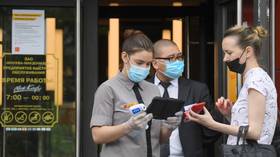Russians who forge vaccination certificates to violate Covid-19 regulations could get a year in prison, warns influential senator

As Moscow looks to halt the spread of Covid-19 by imposing restrictions on the non-vaccinated, a leading Russian senator has revealed that citizens who use fake documents to game the system could face up to a year behind bars.
As of Monday, cafes, bars, and restaurants in Moscow can accept only customers who have been vaccinated against Covid-19, those who have been ill with the virus in the past six months, or visitors who have had a negative PCR test result in the previous three days. Locals who qualify can obtain a QR code on the government services portal.
Because of these restrictions, many unvaccinated Muscovites are looking to other methods to gain a code for access. However, influential senator Andrey Klishas has told RIA Novosti that, if caught, it could lead to jail time.
Also on rt.com Russia records highest official Covid-19 death toll since start of pandemic, as nation fights sharp rise in cases of Delta variant“Acquisition, storage, transportation for use, or the sale or use of a knowingly forged certificate as an official document … is punishable by … up to one year in prison,” the lawmaker warned.
The new restrictions in the capital were announced last week, and since that time, fraudsters have started putting fake QR codes up for sale on the darknet. According to Evgeny Voloshin, a digital risk management expert, the documents are being sold for an average of 11,000 rubles ($150) each.
When a restaurant employee scans a genuine version, their electronic device shows information about the customer, including their vaccination status and passport number, and the customer can then be allowed to sit inside. However, a fake code links the device to a different website, cloned from the official government page, in the hope that the worker won’t notice it’s not legitimate.
Also on rt.com With infectious Delta strain on rise, Moscow to require proof of Covid-19 vaccination or negative test to visit bars & restaurantsHowever, despite Klishas’ threat, lawyers aren’t convinced that forgery of a QR code is punishable by law. According to Dmitry Lipin, of the Moscow branch of the Association of Lawyers of Russia, the criminal code applies only to documents, and a QR code doesn’t count as a document.
Last week, Alexey Nemeryuk, the first deputy chief of staff of Moscow Mayor Sergey Sobyanin, said the city would be forced to live under restrictive measures until its citizens develops herd immunity.
If you like this story, share it with a friend!












